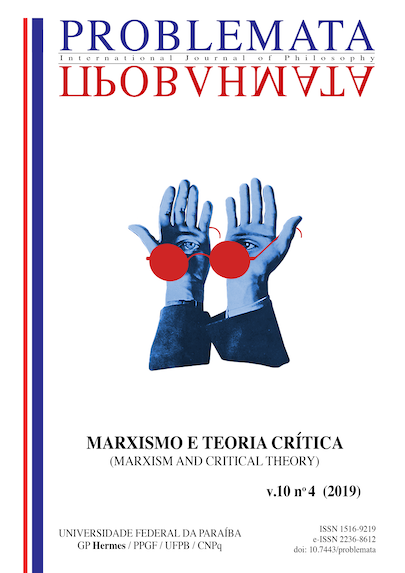HORKHEIMER E AS TENTAÇÕES DA TEORIA CRÍTICA
DOI:
https://doi.org/10.7443/problemata.v10i4.49719Palavras-chave:
Revolução, Mundo administrado, Sociedade burguesa, Teoria críticaResumo
Trata-se de expor alguns elementos centrais da concepção de teoria crítica desenvolvidos por Max Horkheimer. Concepção esta que oscila num campo tenso que vai desde a possibilidade de revolução até a desconfiança de que, tanto o bloco socialista quanto o capitalista pós-guerra, são constituídos por elementos que tendem à anulação do indivíduo através da constituição de uma sociedade totalmente administrada cujo protótipo ideal foi o fascismo. A radicalidade do pensamento crítico de Horkheimer capta um dilema incontornável para o pensamento crítico: tanto as receitas de revolução quanto a supervalorização das forças do indivíduo e da subjetividade confirmam o status quo estabelecido. Enfrentar este diagnóstico radical da nossa realidade apresenta-se como desafio central da teoria crítica. Como fazer a teoria crítica, neste campo de tensões, conferir voz àquilo que os sistemas calam, sem cair na tentação de ceder para um lado ou para outro, assim como também, sem cair no imobilismo? [Resumo do tradutor].
Downloads
Referências
______. Dämmerung. Notizen in Deutschland. In: ______. Gesammelte Schriften in neunzehn Bänden, Bd. 2. Frankfurt am Main: Fischer, 1987a.
______. Die Juden und Europa. In: ______. Gesammelte Schriften in neunzehn Bänden, Bd. 5. Frankfurt am Main: Fischer, 1987b .
______. Gedanke zur Religion. In: ______. Gesammelte Schriften in neunzehn Bänden, Bd. 3. Frankfurt am Main: Fischer, 1988.
______. Notizen 1949-69. In: ______. Gesammelte Schriften in neunzehn Bänden. Bd. 6. Frankfurt am Main: Fischer, 1991.
______. Programm einer intereuropäischen Akademie. In: ______. Gesammelte Schriften in neunzehn Bänden, Bd. 12. Frankfurt am Main: Fischer, 1985.
______. Kritische Theorie gestern und heute. In: ______. Gesammelte Schriften in neunzehn Bänden, Bd. 8. Frankfurt am Main: Fischer, 1985a.
______. Zur Kritik der instrumentellen Vernunft. In: ______. Gesammelte Schriften in neunzehn Bänden, Bd. 6. Fischer: Frankfurt am Main, 1991a.
______. Vernunft und Selbsterhaltung. In: ______. Gesammelte Schriften in neunzehn Bänden, Bd. 5. Frankfurt am Main: Fischer, 1987c.
HORKHEIMER, M.; ADORNO, T. W. Dialektik der Aufklärung. In: HORKHEIMER, M. Gesammelte Schriften in neunzehn Bänden, Bd. 5. Frankfurt am Main: Fischer, 1987. [Edição brasileira: Dialética do esclarecimento: fragmentos filosóficos. Trad. Guido de Almeida. Zahar: Rio de Janeiro, 2006].
NIETZSCHE, F. Also sprach Zarathustra. In: ______. Das Hauptwerk, Bd. III. München: Nymphenburger Verlag, 1990. [Edição brasileira: Assim falava Zaratustra. Trad. José Mendes de Souza. Fonte digital: http://www.ebooksbrasil.org/adobeebook/zara.pdf, 2002].
______. Jenseits von Gut und Böse. Vorrede. In: ______. Werke in sechs Bänden, Bd. IV. Hrsg. Karl Schlechta. München; Wien: Carl Hanser, 1980. S. 565-566. [Edição brasileira: Além do bem e do mal ou prelúdio de uma filosofia do futuro. Trad. Márcio Pugliesi. Curitiba: Hemus, 2001].
WIGGERSHAUS, R. Die Frankfurter Schule. Rowohlt: München, 1986. [Edição brasileira: A Escola de Frankfurt: história, desenvolvimento teórico, significação política. Trad. Lilyiane Deroche-Gurcel. Rio de Janeiro: Difel, 2002].
Downloads
Publicado
Edição
Seção
Licença
Autores que publicam nesta revista concordam com os seguintes termos:
- Autores mantém os direitos autorais e concedem à revista o direito de primeira publicação, com o trabalho simultaneamente licenciado sob a Licença Creative Commons Attribution que permite o compartilhamento do trabalho com reconhecimento da autoria e publicação inicial nesta revista.
- Autores têm autorização para assumir contratos adicionais separadamente, para distribuição não-exclusiva da versão do trabalho publicada nesta revista (ex.: publicar em repositório institucional ou como capítulo de livro), com reconhecimento de autoria e publicação inicial nesta revista.
- Autores têm permissão e são estimulados a publicar e distribuir seu trabalho online (ex.: em repositórios institucionais ou na sua página pessoal) a qualquer ponto antes ou durante o processo editorial, já que isso pode gerar alterações produtivas, bem como aumentar o impacto e a citação do trabalho publicado (Veja O Efeito do Acesso Livre).








